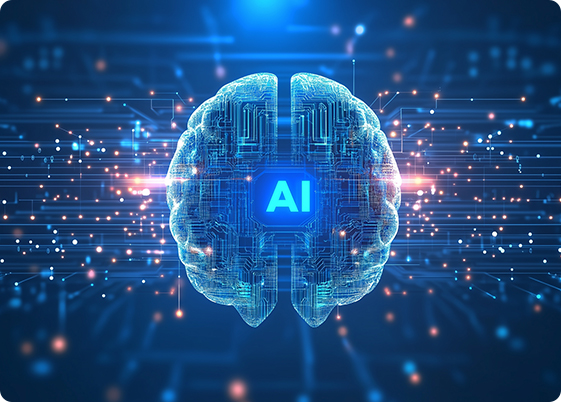
Artificial Intelligence (AI) is revolutionising business operations globally, including India, and hence opening career opportunities for countless freshers and working professionals. To have a career in this field, one must first know the must-have skills, software knowledge, and entry-level career opportunities.
Here's a simple step-by-step guide for beginners aspiring to build an AI career from scratch, starting from the basics, moving ahead to core concepts, and finally, practical implementation for a solid jump-start into one of today's hot career areas.
Understanding AI: The Foundation
Artificial Intelligence (AI) is not something for the future anymore; it's already here with us. Right from e-commerce websites providing personalised recommendations to chatbots responding to customer queries, AI is suffused in every part of our lives. For the freshers eager to begin their careers in AI, it's essential to lay the fundamentals.
There are many various careers in artificial intelligence, but to begin, there is a need to establish a good grasp of programming, mathematics, and data management. These are the building blocks on which sophisticated AI models are built.

Why is AI Important?
As technology advances, AI is being implemented across various industries, including healthcare, finance, retail, and manufacturing, to improve lives. These fields are now depending on AI to improve efficiency, accuracy, and innovation.
After knowing the answer to the question “why is AI important”, you will understand why AI is one of the most promising topics in the 21st century.
- Healthcare: With the help of AI, the medical field has also evolved, as it aids in identifying various diseases, predicting treatment outcomes, and even developing new medicines.
- Finance: In this field, integrating systems and software helps with tasks like fraud detection, risk analysis, and performing algorithmic trading.
- Customer Service: With AI for Customer Service, organisations are enhancing the customer experience through intelligent, high-speed support systems, offering 24/7 services and easy-to-understand guides.
- Retail: Here, demand prediction and recommendation engines are machine learning-based.
The growing demand for AI across industries strongly connects AI and future jobs, making it a secure and rewarding career prospect.
How to Launch a Career in AI: A Step-by-Step Guide
Starting a career in AI can feel overwhelming due to its vastness, but the process becomes manageable when broken into structured steps. Whether you’re a fresher exploring AI career paths for beginners or a professional transitioning into tech, this roadmap highlights the must-know skills, experiences, and strategies that will help you confidently move forward.
Step 1: Discover Your Journey in AI
Finding your path in AI is the initial step, as AI is a vast field with several paths to follow. Selecting your AI career path is based on your interests and strengths. Some of these paths are as follows:
Machine Learning (ML) Engineer
An ML Engineer's job is to develop and train algorithms to enable systems to learn and enhance themselves automatically.
Data Scientist
Expertise in deriving insights from data, integrating statistics, programming, and domain knowledge.
AI Researcher
A research specialist in AI investigates leading-edge developments in AI, ranging from natural language processing to computer vision. His work involves researching new developments and then helping to integrate them into the system for further development.
AI Ethics Specialist
The work of an AI Ethics specialist is to ensure that AI systems are impartial, transparent, and neutral, thereby solving the ethical problems associated with technology, making it crucial to integrate decision-making capabilities in AI.
Robotics Engineer
Develops and constructs intelligent machines that can engage with the physical world. Each AI career path for beginners has its own requirements, but is built on the same technical and analytical foundation.
Step 2: Master the Core AI Skills
It is crucial to master the fundamentals of AI, as you need to lay a solid foundation, and you must gain key AI job skills that employers can benefit from.
Programming Languages for AI
To obtain your certification, you need to have hands-on experience. Try to work with Python, R, and Java, as they are the three major languages used for AI development.
Study Mathematics and Statistics for AI and Data Science
Learn about topics such as linear algebra, calculus, and probability theory, which are essential for understanding algorithms.
Machine Learning and Deep Learning
Apply practically any algorithm to ML and DL models, utilising practical knowledge, which forms the majority of most AI and ML career path positions.
Artificial Intelligence Engineer Skills will definitely give you an edge when searching for specific roles. For a wider analysis, refer to this guide on becoming an AI engineer.
Step 3: Obtain Practical Experience
One has to gain practical experience to separate theory from practice.
Projects
Build projects like AI-powered applications like chatbots, image classifiers, or recommendation systems. To showcase your skills, projects help create an outstanding portfolio for anybody interested in learning how to build a career in AI.
Internships
Work with companies and mentors to learn through practice and gain knowledge on industry-level projects.
Competitions
Take part in hackathons or Kaggle competitions to compete against real-world problems. Practical experience is a vital part of your AI career roadmap, and it showcases your ability to solve industry-level challenges.

Step 4: Utilise Online Resources and Certifications
Certifications are proof of your skills and assurance to recruiters that you are serious about having an AI career path.
edX
Another trusted platform that offers industry-specific courses in artificial intelligence and data science to upskill.
Udacity
Specialises in nano-degrees in machine learning, deep learning, and AI
Google AI
Free publications and research papers to establish solid foundations. It is simpler to highlight your skills by adding certifications to your profile to show your expertise in careers in artificial intelligence.
Step 5: Network and Stay Updated
Networking helps you stay ahead of rapid developments in AI. Join LinkedIn groups, attend industry conferences, and engage in webinars. Following AI leaders and research labs keeps you up to date with the latest trends and breakthroughs. Staying connected is essential for building a long-term AI developer career path.
Step 6: Prepare for the Job Market
When you’re ready to apply, start by tailoring your resume to highlight relevant skills and projects. Employers are often looking for professionals who can demonstrate AI skills in demand, such as natural language processing, deep learning, and data visualisation.
Browse IT job openings to explore opportunities in AI, data, and digital roles. Highlight measurable achievements like “built an AI model that increased accuracy by 15%” to stand out from the competition.
Key Challenges in Launching a Career in AI
Pursuing a career in AI is rewarding, but it comes with challenges that every beginner must be aware of. From the fast pace of technological change to ethical debates around responsible AI, these obstacles can seem daunting.
However, with resilience and adaptability, you can turn them into opportunities for growth.
Rapid Technological Changes
AI evolves rapidly, and keeping up with new algorithms, frameworks, and tools can be a significant challenge.
High Competition
With AI being one of the most attractive fields, competition for top positions is fierce.
Ethical Considerations
AI professionals must address issues such as bias, fairness, and privacy.
Access to Resources
Not all learners have equal access to high-quality education and computing resources. Overcoming these challenges is key to building resilience in your AI engineer career path.
The Future of AI Careers
The future looks bright for careers in AI. As organisations continue to adopt automation, predictive analytics, and intelligent systems, professionals with AI expertise will remain in high demand. Emerging fields like explainable AI, edge AI, and human-AI collaboration are shaping the next generation of opportunities.
In India, AI adoption is skyrocketing across IT, healthcare, and financial services, creating strong demand for skilled professionals. Exploring a career path in artificial intelligence now means securing a strong position in tomorrow’s workforce. Whether you’re just starting or planning to pivot your career, the demand for AI professionals will only grow.
Conclusion
For beginners, launching a career in AI requires a clear strategy, the right skills, and continuous learning. By understanding the fundamentals, gaining hands-on experience, and staying updated, you’ll be ready to succeed in one of the most dynamic fields today. Whether you’re considering an AI career path for beginners or aiming for advanced roles, the opportunities are endless.
From learning how to build a career in AI and machine learning to identifying your AI career roadmap, this guide gives you the foundation you need. The journey is challenging, but the rewards—both professional and personal—are worth it. Now is the time to invest in your future and step confidently into the world of careers in AI.
Organisations such as HGS India are also investing in AI talent, making it a great time for beginners in India to pursue this career path.
FAQs
What is the difference between Machine Learning and Deep Learning?
Machine Learning focuses on training models to make predictions based on data, while Deep Learning is a subset of ML that uses neural networks to model complex patterns and structures.
How can AI be applied in the real world?
AI can be applied in customer service, healthcare, manufacturing, retail, and finance to optimise processes and improve outcomes.
What are some of the most popular AI applications?
Chatbots, virtual assistants, recommendation systems, self-driving cars, and fraud detection systems are some popular applications.
How long does it take to become proficient in AI?
It depends on your background and commitment. With consistent study and practice, beginners can reach a professional level in 12–24 months.
 India
India Canada
Canada Colombia
Colombia Jamaica
Jamaica Philippines
Philippines UK
UK US
US SA
SA



